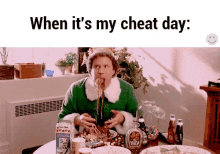A cheat day makes no sense logically. But makes perfect sense psychologically.
Sure, it sounds more logical in the minds of nutrition nerds for you and I to eat grilled chicken and steamed broccoli every day. But c’mon. Who the hell is going to stick with that?
The psychological benefits of cheat days are pretty obvious. They reduce feelings of deprivation. Break up the monotony. Making your diet more sustainable.
And don’t forget the social benefits. There’s nothing worse than going out to eat with a friend who refuses to budge on their insert-hot-diet-of-the-times. It sucks all the fun out of the meal.
We don’t need to understand the science or underlying mechanisms behind cheat days (god knows I don’t). But the evidence is abundantly clear for anyone who has tried them. Spoiler: they work!
So what if the same applies to your content diet? What if you gave yourself complete freedom one day a week to consume all the junk content you can get your filthy paws on?
I know, I know, that sounds insane. But stick with me.
I call this your content cheat day.
Circa 2020, I attempted to become junk content sober.
I deleted all social media off my phone because I could tell I was becoming mentally obese.
I felt the FOMO flowing through my veins for a few weeks but it was actually quite nice after the initial shock to my system.
I cleaned up my content diet and thought I’d never look back. I started reading way more books (50+ per year), listening to thought-provoking podcasts, and watching boatloads of mind-expanding documentaries (shoutout Ken Burns).
But there was one glaring problem.
I became totally unrelatable. I was completely detached from the culture. Basically, by completely shutting myself off from the junk content everyone else was consuming, I had no clue what was going on.
Sitting on my high horse with judgment oozing from my pores felt cool for a while. Until it didn’t.
I became the friend who refuses to budge on their strict diet when eating out. It sucked all the fun out of my interactions. Preferring to talk about some obscure book I had just read like Neil Postman’s 1985 gem Amusing ourselves to death. When everyone else just wanted to talk about the silly news du jour.
That’s when I decided to give this whole content cheat day thing a try.
I still stuck to my nutritious content diet six days a week, but allowed myself one cheat day to go buck wild. Reality TV, cat videos, celebrity gossip articles, you name it. Nothing was off limits.
I’ve been doing this for a few years and have noticed the benefits seem eerily similar to food cheat days.
First, it’s a helluva lot easier to stick to a healthy content diet when you know in the back of your mind you are never more than six days away from a naughty little cheat day.
Second, total abstinence from junk content mixed with total indulgence is way easier than trying to moderate your content intake daily. A little junk here and there quickly snowballs into a disaster and you feel guilty all the time.
Third, above all, it’s actually sustainable for the long haul. You aren’t trying to eliminate all the junk content from your life until the heat death of the universe. That may be the optimal choice logically. But where’s the fun in that?
I love stuffing my face with a dozen cupcakes on my food cheat days. It’s no different for my content cheat days. I’ll admit it — I love some junk content as much as the next fellow.
Content cheat days sound great in theory, but do they actually work in practice?
Only one way to find out.
PS — I’m not a doctor and don’t play one on the interwebs. Speak to yours to determine if content cheat days are right for you.
Your thoughts? Comments? Complaints? Please leave a reply below.





alt thought - consume only junk but pretend it is good for you - sincerely, 99.9% of the internet // alt alt thought - content fasting - consume nothing, make nothing, enjoy nothing and tell no one about it
I wonder if the "junk" content is actually a form of cultural anthropology. Think about it: we're observing the collective consciousness, the trends, the humor, the anxieties of our time. It’s like studying the folklore of our era. Future historians might look back at our memes and reality shows to understand what we valued, what we feared, and what made us laugh. In that sense, indulging in "junk" content isn't just entertainment; it's research. We're gaining insights into the human condition, albeit in a roundabout way.